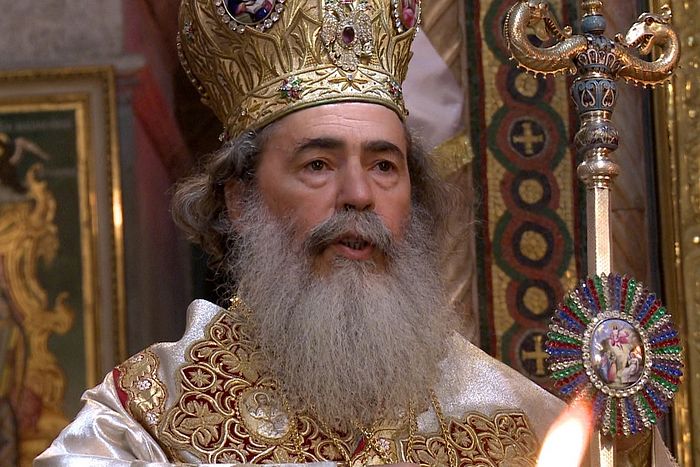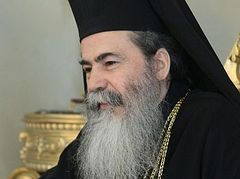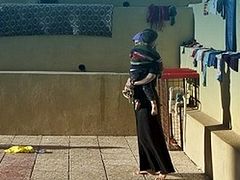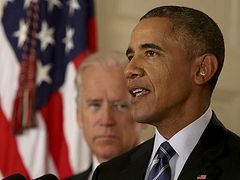Source: Jerusalem Patriarchate
April 19, 2016
Introductory remarks of His Beatitude Patriarch Theophilos III at the conference "Pursuing Peace and Strengthening Presence" - Atlanta Summit of American and Palestinian Churches:
Your Beatitudes,
Your Eminences,
Reverend Fathers and Pastors
Distinguished Representatives of the Churches in the U.S.A.
Ladies and Gentlemen,
We are honored to be here at this important conference, that brings together Christians from the Holy Land and the United States, both for deepening collaborative efforts between us for peace-building as well as for finding new ways of supporting and strengthening the Christian communities of the region.
We are pleased to be sharing the podium this afternoon with the Heads of the Churches of the Holy Land, and we would like to acknowledge especially all those who have made this conference possible, especially Mr. Hanna Amireh, the Chairman of the Committee on Church Affairs of the State of Palestine, and the Carter Center here in Atlanta.
Our subject for these introductory remarks is “The Church and its Roots in the Holy Land,” and this is the right place to begin. To speak of “roots” and “rootedness” is to speak in very specific and profoundly theological and spiritual, as well as historical, terms.
We all understand the deep historical roots of the Church in the Middle East in general and in the Holy Land in particular. The Church was revealed at Pentecost in Jerusalem, and from those beginnings there has been a continuous Christian presence in the region. Over the centuries the Church has maintained our living presence in the face of a range of political, social, religious, and military changes. We have maintained our responsibility to be the guardians and the servants of the Holy Places, a responsibility that has been entrusted to us by Divine Providence, established by the life of the Church, affirmed by the Covenant of Omar ibn Al-Khattab, and guaranteed by the Status Quo, which was itself introduced by the international community. We have always borne witness to the religious, cultural, and ethnic diversity of the Holy Land.
In particular, we know that the presence of the Church has not only been a part of the political history of the region; Christianity has been a witness to its sacred history, and this sacred history embraces not only Christianity, but also to the other Abrahamic traditions, Judaism and Islam. Our roots drink of the same spiritual nourishment and Christianity is a natural and essential component of the spiritual geography of our region:
If our historical roots are clear enough, it is our theological and spiritual rootedness to which we would like to address a few brief comments. The Holy Land is the meeting place between Divinity and humanity, where God and human beings have conversed together. The-Holy Land is the place where heaven and earth are joined, where the Incarnate Logos took flesh, was born, lived among us, suffered death, and was raised from the tomb. For Christians, and indeed for others there is no doubting the eternal significance of this encounter between God and humanity in this specific place and in a specific time in history.
And while the Incarnation is certainly a matter of history, it is also a matter of faith. Our rootedness as Christians comes not just from our long history, which has shaped and formed our living in this land; it comes from the relationship that we have with the living God and the his followers.
As we are reminded in Saint Paul’s Letter to the Ephesians,
I pray that% according to the riches of his glory, he may grant that you may be strengthened in your inner being with power through his Spirit, and that Christ may dwell in your hearts through faith, as you are being rooted and grounded in love. I pray that you may have the power to comprehend, with all the saints, what is the breadth and length and height and depth, and to know the love of Christ that surpasses knowledge, so that you may be filled with all the fullness of God.
(Eph. 3:16-19)
Such rootedness is of profound significance for the Christian presence in the Holy Land,for our rootedness is deep within the heart of God himself.
Nor can we forget another fundamental theological truth that waters the roots of the Church in the Holy Land. We embrace the understanding that human beings are created in the image and likeness of God and this truth is the foundation for our understanding of the human person. But more than this, by extension we say that not only do we share a common humanity that is a mirror to us of God; we are also created of the same earth. The Church in the Holy Land not only has deep roots; we are created from the very earth in which those roots are anchored. And we return to this same earth.
This earth belongs to all. The particular earth of the Holy Land is not only our common home; it is our common origin and our common destiny. According to the Book of Genesis, we were “formed from the dust of the earth” (Gen. 2:7), and this common origin must be a reminder that we are united in a new common purpose to work together for the well-being and the flourishing of all who call the Holy Land their home and Jerusalem both their physical and spiritual capitol.
To be rooted, to speak of the roots of the Church in the Holy Land, then, is to speak at several levels, historical, spiritual, theological, even political – all of them significant. The Christian presence in Jerusalem and the Holy Land, and indeed throughout the entire Middle East, is under pressure in a way that is unprecedented in recent times. Christians face violence, displacement, and persecution, and they are often forced into migration, as are members of other religious affiliations. Once again the roots of the Church in the Holy Land are being watered by human blood.
In the face of such atrocities, we must not be fatalistic; our rootedness in the Holy Land and our witness to sacred history must nourish in us the gifts of the Spirit of which Saint Paul speaks so eloquently in the Letter to the Galatians:
In contrast to the fruits of a worldly mind, Saint Paul asserts that the fruit of the Spirit is love, joy, peace, patience, kindness, generosity, faithfulness, gentleness, and self-control (Gal . 5:22-23).
These fruits of the Spirit enable us to be free of possessiveness and make it possible for us: to see each other as those who are made in the image and likeness of God and who share a common humanity and a common destiny.
We live on the earth and not in heaven, and of course we remain deeply concerned for the future of the Christian presence in the Holy Land, as well as for the future of the Christian character of Jerusalem; without invalidating the legitimate claims of others. We are not interested in superiority over others, but we affirm that the long history and culture of our region in all its diversity has been shaped and formed by this Christian presence and the Holy Places
Christianity has produced in our region a civilization that is inclusive not exclusive. A civilization that values the rich diversity of peoples, languages, cultures, and traditions. A civilization that is practiced in the art of enabling diverse communities to live alongside each other, not simply in peace, but in a fruitful co-existence and harmony in which we honor the best and noblest in the other.
As an illustration of this, we wish to acknowledge the contribution of non-Christian leaders in the current ongoing historic restoration of the Sacred Aedicule of the Holy Tomb, a group of leaders that includes His Majesty King Abdullah II of the Hashemite Kingdom of Jordan, His Excellency the President of the Palestinian State, and others.
This is the kind of fruit that our roots in the Holy Land have produced, this Holy Land that encompasses the Hashemite Kingdom of Jordan and the States of Palestine of Israel. Our rootedness, like our spiritual mission, exists not for ourselves alone, but so that the Church in the Holy Land may remain an eternal witness to our region, and a beacon to the world – a world that is crying out for hope and spiritual refreshment.
May this summit be a further step along the way of establishing reconciliation, mutual respect, vital co-existence, and a: lasting peace, so that all who call Jerusalem, the Holy Land, and the Middle East their home may flourish and glorify the Name of our common Creator.
Thank you.
His Beatitude
THEOPHILOS III
Patriarch of Jerusalem




